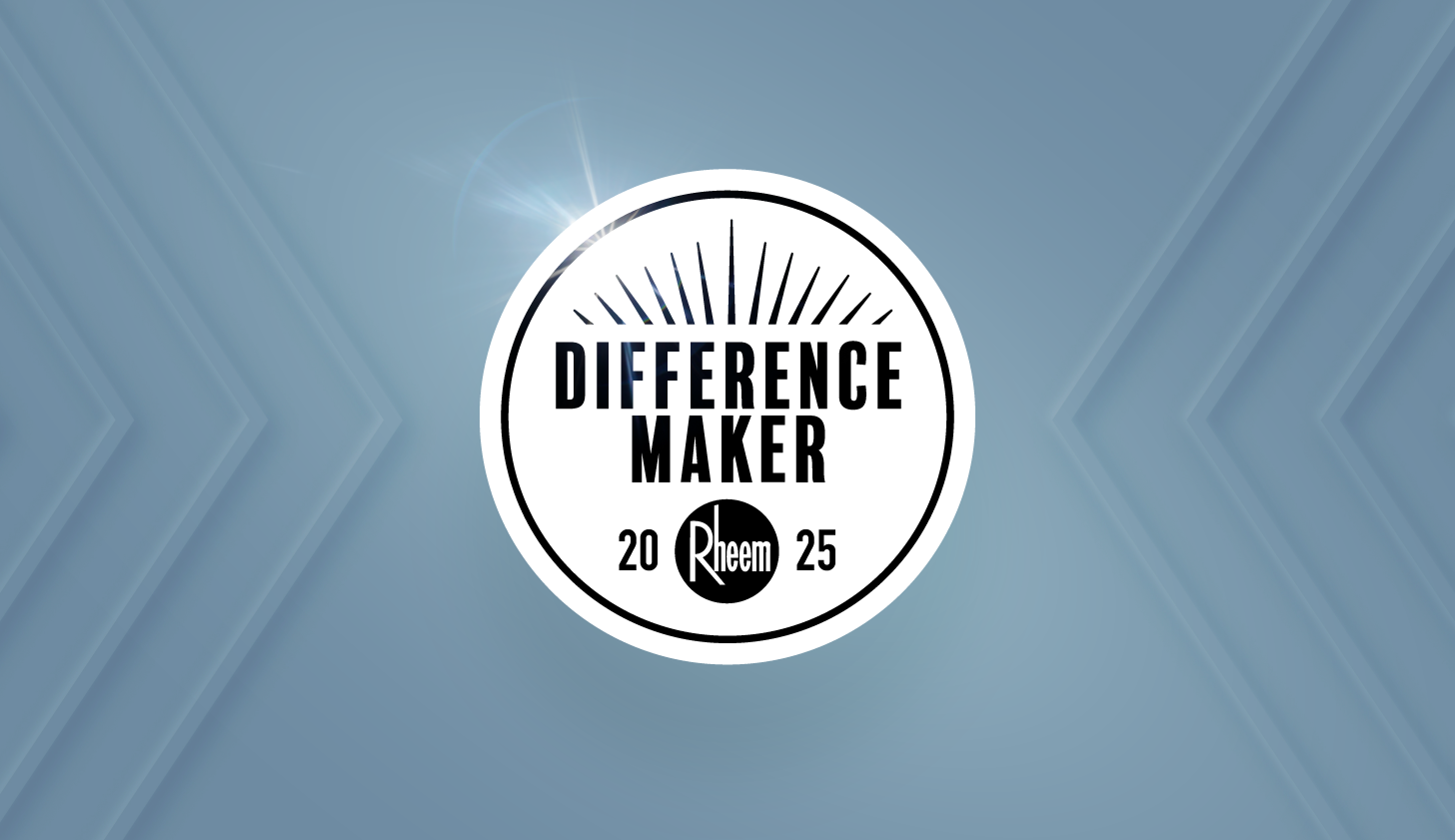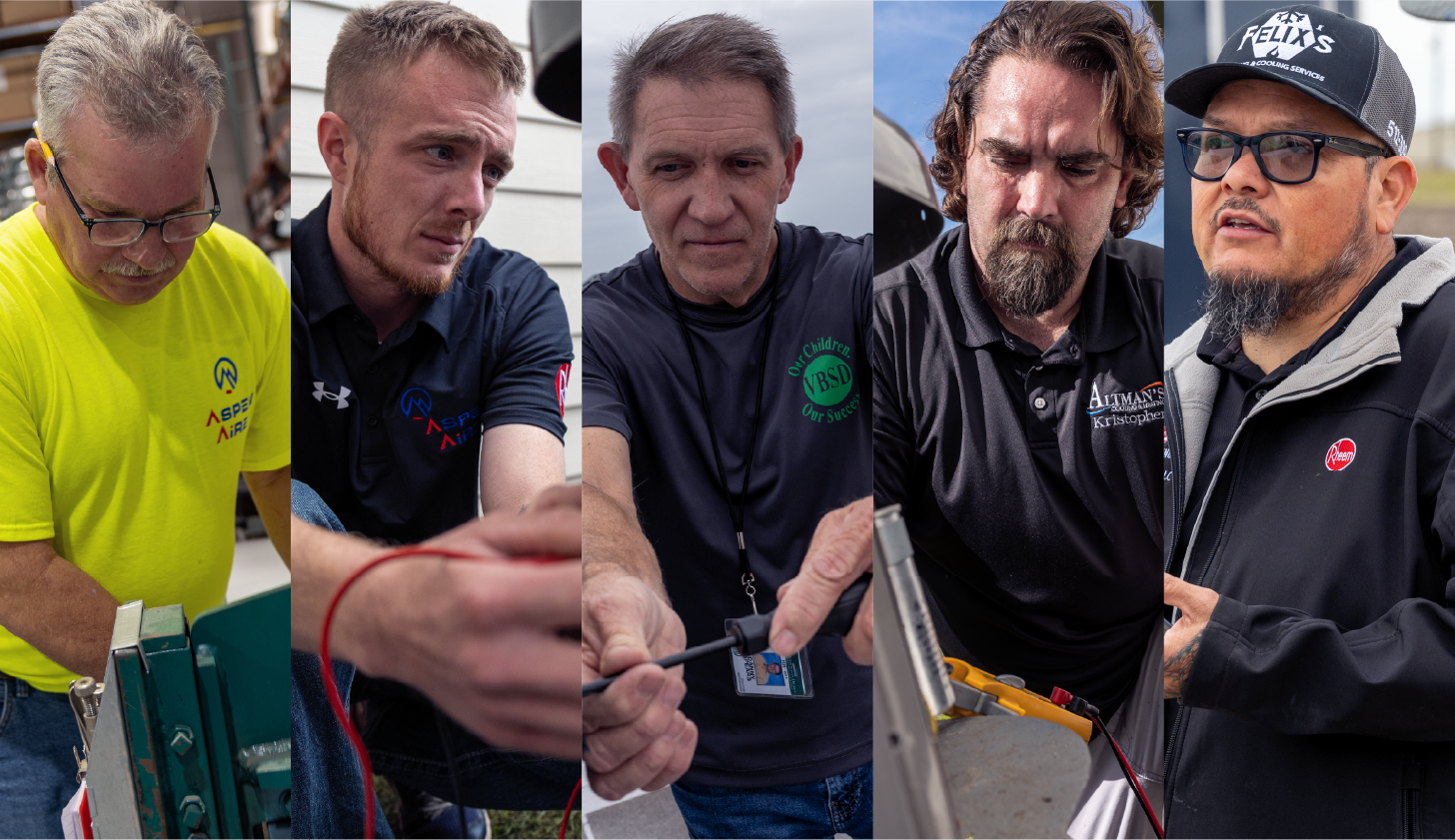What Is a Heat Pump Water Heater?
September 17, 2025
Heat pump water heaters are an impressive way to heat water in homes, yet many people don’t quite understand how they work. They’re innovative and efficient, but what exactly are they?
In this guide, you’ll learn how heat pump water heaters work, the different types available, who they benefit, and the full range of advantages they offer.
The Basic Breakdown
Heat pump water heaters use heat from the surrounding air to warm water. This makes them a highly energy-efficient alternative to traditional water heaters by helping homeowners save on utility bills while qualifying for generous rebates and tax incentives. As sustainability becomes a higher priority, both plumbers and homeowners are turning to heat pump water heaters to help save money and energy, all with advanced technology.
How a Heat Pump Water Heater Works
Working like a refrigerator in reverse, a heat pump water heater uses electricity to move heat from the surrounding air rather than generating heat directly. This makes it far more energy-efficient than traditional models.
Here’s a simplified breakdown of the heat pump water heating cycle:
- Heat Extraction: A built-in fan pulls in ambient air, and a refrigerant absorbs the heat. As the heat is extracted, the surrounding air is cooled and vented back out.
- Compression: The refrigerant gas is compressed, which raises its temperature and pressure. This is what makes the captured heat hot enough to warm the water.
- Heat Transfer: The now-hot refrigerant flows through condenser coils wrapped around the tank. These coils act like a heat exchanger, efficiently transferring heat to the water inside.
- Cycle Repeats: After the refrigerant transfers its heat, it cools down, returns to a liquid state, and re-enters the evaporator to start the cycle again.
- Hybrid Heating: In colder conditions or during periods of high hot water demand, hybrid electric heat pump water heaters supplement the heat pump with traditional electric elements to ensure consistent performance.
What Is a Hybrid Water Heater?
Hybrid water heaters combine heat pump technology with traditional electric resistance heating. These units can be adjusted to operate in different modes for energy efficiency or high demand, depending on your household’s hot water needs.
Take the Rheem® ProTerra® Hybrid Electric Heat Pump Water Heater, for example. It blends hybrid heating performance with smart efficiency, delivering up to 4 times the efficiency of a standard electric model. Producing zero on-site emissions and significantly fewer greenhouse gases than conventional tank-style units, this hybrid system uses about one-third of the electricity of a traditional electric water heater. It’s an ideal solution for homeowners seeking both sustainability and performance.
How Energy-Efficient are Heat Pump Water Heaters?
Heat pump water heaters are among the most energy-efficient heating systems available for residential use. By using heat from the surrounding air rather than generating it directly, heat pump water heaters consume about one-third the electricity of traditional electric water heaters.
As an energy-efficient heat pump solution, heat pump water heaters not only lower energy consumption but also help reduce greenhouse gas emissions, making them a smart choice for homeowners focused on sustainability. Over time, reduced energy use results in substantial cost savings through lower monthly utility bills, especially in homes with high hot water demand.
What are the Benefits of Heat Pump Water Heaters?
Let’s get more into the specifics of the real impact a heat pump water heater can have in your home:
- Tax Credits and Incentives: Because heat pump water heaters are recognized as highly energy-efficient upgrades, they qualify for ENERGY STAR 5.0® certification, federal and local incentive programs, and the federal residential 25C tax credits. These programs significantly reduce the upfront cost for homeowners. Visit our resources page or check with your local utility company for the latest details on available tax credits, incentives, and rebates.
- Energy Cost Savings: Beyond the upfront savings, a heat pump water heater delivers impressive ongoing energy savings. Homeowners can save up to $576 annually on their utility bills, amounting to nearly $5,760 over 10 years. That’s because heat pump water heaters use 75% less energy than a standard electric water heater, making them a top choice for those seeking an energy-saving water heater. Heat Pump Water Heater Factors:
-
- Annual Energy Savings – Up to $576/year
- 10-Year Savings – Up to $5,760
- Energy Use Reduction – Uses 75% less energy than a standard electric water heater
- Rebate Potential – Eligible for up to $2,000 in federal tax credits + local rebates
- Earth-Friendly Efficiency: Heat pump water heaters minimize your environmental footprint by producing zero on-site emissions and reducing greenhouse gas output through lower energy consumption. This eco-conscious performance is why numerous programs support homeowners switching to these energy-efficient heating systems.
- Smart Features: Equipped with EcoNet® technology, many of Rheem’s heat pump water heater models offer built-in Wi-Fi connectivity to link to the EcoNet app on your smart device. This allows remote control, scheduling, and energy usage tracking to help maximize your savings. Features like the Hot Water Availability Indicator and adjustable operation modes ensure you never run out of hot water.
- Long Lifespan: Another key advantage is the extended lifespan of water heaters when using heat pump technology. According to the U.S. Department of Energy, heat pump water heaters typically last 10 to 15 years, compared to 8 to 12 years for traditional tank models. This durability adds long-term value and peace of mind to your investment.
What are the Different Types of Heat Pump Water Heaters?
Heat pump water heaters come in a few main types, depending on how they’re built and where they’re used:
- Integrated (All-in-One) Units:
These are the most common for residential use. The heat pump and water storage tank are combined into a single unit, making installation and operation straightforward. - Split-System Models:
Less common in U.S. homes, these systems separate the heat pump from the storage tank. They’re more flexible in terms of installation but are typically used in specialized setups. - Commercial Heat Pump Systems:
Designed for high-demand applications like multi-family buildings, commercial kitchens, or facilities, these systems vary in design and capacity and often require professional planning and installation.
What Does Rheem Offer?
Rheem specializes in integrated residential heat pump water heaters, such as the ProTerra® Hybrid Electric series, which offers up to 4x the efficiency of standard electric models and includes smart, user-selectable modes for energy savings and performance.
Rheem also offers select 120V plug-in models, ideal for retrofit scenarios like replacing a gas unit without major electrical upgrades, all while delivering up to 5x the efficiency of a standard gas water heater.
For larger needs, Rheem provides commercial-grade heat pump systems designed for higher-volume hot water applications, with models built for light commercial use and multi-unit properties.
Not sure which model fits your needs? See our lineup of heat pump water heaters or contact an expert today who can help answer your questions.
Installation Considerations for Heat Pump Water Heaters
When planning to install a heat pump water heater, there are a few things to keep in mind. Heat pump water heaters require installation in areas with ambient air temperatures between 37°F and 145°F and at least 700 cubic feet of air space, making locations like basements or garages ideal. For smaller spaces or when ambient air temperatures fall outside of the ideal range, the heat pump can be ducted to bring in and/or exhaust air to or from another area. Thanks to hybrid functionality, they can switch to standard electric heating during cold weather or peak demand, ensuring reliable hot water. While the upfront cost is higher than traditional models, it’s often balanced out by energy savings and available rebates, making them a smart, long-term investment.
Who Should Consider a Heat Pump Water Heater?
Heat pump water heaters are an excellent choice for a wide range of homeowners, especially those looking to reduce heating costs and improve home efficiency. They’re ideal for:
- Homeowners in regions with high electricity rates, such as the West Coast, where energy savings can quickly offset the cost of a water heater replacement.
- Those interested in home winterization and reducing their carbon footprint through lower energy use and fewer greenhouse gas emissions.
- Homes in mild climates, where heat pump performance remains strong. In colder climates, a hybrid model may be a better fit to ensure consistent hot water.
- Properties with sufficient installation space (at least 700 cubic feet of air volume), which is necessary for the heat pump system to operate efficiently.
What are the Maintenance Requirements for Heat Pump Water Heaters?
To keep your heat pump water heater running efficiently, it’s important to schedule annual inspections and maintenance. Simple tasks like filter cleaning and checking for error codes can extend its lifespan and prevent issues.
Need support? Find a Rheem plumber or contractor to help with installation and maintenance.
Want more tips? Subscribe to our blog for the latest in plumbing solutions.







